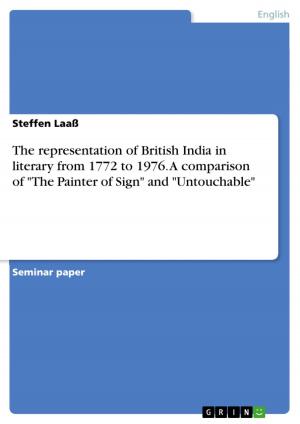Recent changes in the constitution of Great Britain
Nonfiction, Reference & Language, Study Aids, ESL, Foreign Languages| Author: | Maria Brüßler | ISBN: | 9783638217637 |
| Publisher: | GRIN Publishing | Publication: | September 25, 2003 |
| Imprint: | GRIN Publishing | Language: | English |
| Author: | Maria Brüßler |
| ISBN: | 9783638217637 |
| Publisher: | GRIN Publishing |
| Publication: | September 25, 2003 |
| Imprint: | GRIN Publishing |
| Language: | English |
Seminar paper from the year 2003 in the subject English Language and Literature Studies - Culture and Applied Geography, grade: 2 (B), University of Leipzig (Anglistics), course: British Politics and Society Today: An Introduction, 10 entries in the bibliography, language: English, abstract: Before dealing with the actual topic it is necessary to explain how the current situation could arise. This will be done in the following with a very brief overview over the history of the British constitution and its main sources. The first document belonging to the constitution is the Magna Charta from 1215. It was to protect the rights of the community against the Crown. As a result of the Declaration of Rights the powers of Parliament were extended by the Bill of Rights in 1689. Thirdly in 1832 was the Great Reform Bill which reformed the system of Parliamentary representation. The last great reforms were in 1911 the Parliament Act which decreased the power of the House of Lords and in1918 the Representation of the People Act which gave women over 30 the right to vote. As a result of this development the British people are not citizens as in any other modern, democratic state but they are subjects of the Crown and accept the Queen as their head of state. It can be seen that the constitution dates back almost 800 years. This is much more than many other constitutions, for example the German one. As one can imagine it has undergone many grave changes. During the 18th century it was an aristocratic 'balanced' constitution. In the course of the Victorian Age it became a middle-class liberal constitution which developed to the liberal democratic constitution that it is today. Furthermore a few words to the process of change have to be said in advance. This process consists of dialogue between the forces of conservation on the one hand and the forces of transformation on the other. The resulting upshot is always a compromise which represents the terms and arrangements on which a country can be ruled and which the people will accept.1 1 Coxall, Bill/Robins, Lynton: Contemporary British Politics. London: Macmillan Press Ltd, 1998, p. 165
Seminar paper from the year 2003 in the subject English Language and Literature Studies - Culture and Applied Geography, grade: 2 (B), University of Leipzig (Anglistics), course: British Politics and Society Today: An Introduction, 10 entries in the bibliography, language: English, abstract: Before dealing with the actual topic it is necessary to explain how the current situation could arise. This will be done in the following with a very brief overview over the history of the British constitution and its main sources. The first document belonging to the constitution is the Magna Charta from 1215. It was to protect the rights of the community against the Crown. As a result of the Declaration of Rights the powers of Parliament were extended by the Bill of Rights in 1689. Thirdly in 1832 was the Great Reform Bill which reformed the system of Parliamentary representation. The last great reforms were in 1911 the Parliament Act which decreased the power of the House of Lords and in1918 the Representation of the People Act which gave women over 30 the right to vote. As a result of this development the British people are not citizens as in any other modern, democratic state but they are subjects of the Crown and accept the Queen as their head of state. It can be seen that the constitution dates back almost 800 years. This is much more than many other constitutions, for example the German one. As one can imagine it has undergone many grave changes. During the 18th century it was an aristocratic 'balanced' constitution. In the course of the Victorian Age it became a middle-class liberal constitution which developed to the liberal democratic constitution that it is today. Furthermore a few words to the process of change have to be said in advance. This process consists of dialogue between the forces of conservation on the one hand and the forces of transformation on the other. The resulting upshot is always a compromise which represents the terms and arrangements on which a country can be ruled and which the people will accept.1 1 Coxall, Bill/Robins, Lynton: Contemporary British Politics. London: Macmillan Press Ltd, 1998, p. 165















